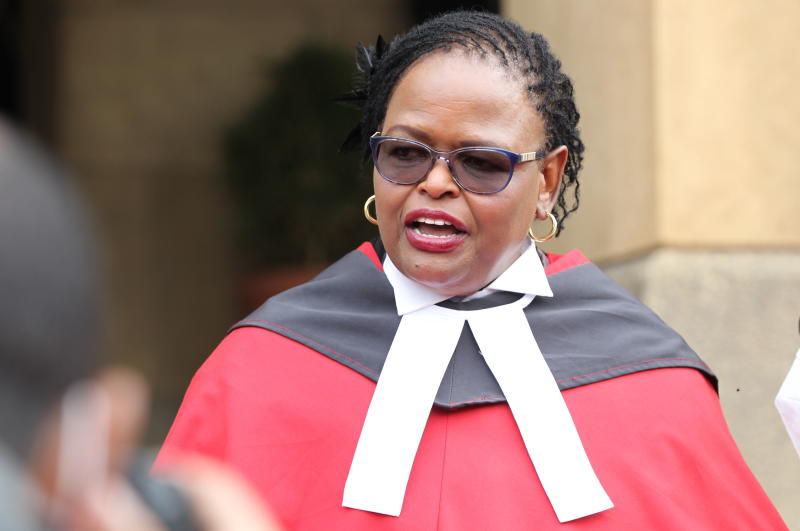Kenya’s Paul Gicheru surrenders to the ICC: Coincidence or plan?
- Spotlight East Africa
- Nov 18, 2020
- 3 min read
The surrender of a Kenyan lawyer to the International Criminal Court (ICC) at the Hague earlier this month has reignited the politics around the ICC cases, and may shape political manoeuvrings ahead of the 2022 elections.

On 2 November, Paul Gicheru, a lawyer and board chair of a state corporation, surrendered to Dutch authorities after landing in Amsterdam with his wife.
Dutch authorities then processed him and he was handed over to the ICC that has had an outstanding warrant against Gicheru and two other Kenyans. The indictment against Paul Gicheru and Philip Kipkoech Bett, one of the other two Kenyans still wanted by the ICC, was issued in March 2015.
It accused the two of leading the backhanded efforts to tamper with witnesses in the original case against Deputy President William Ruto and radio journalist Joshua Sang.
The third Kenyan still wanted by the ICC is Walter Barasa, a journalist who lost an appeal against extradition in August 2019. His indictment was issued in August 2013.
The original six cases have all since collapsed.
Gicheru’s case has revived the ICC question that played a major role in the election of President Uhuru Kenyatta and Deputy President William Ruto in 2013. In the days following news of Gicheru’s unexpected travel and surrender, some of Ruto’s allies saw the move as a new front by the state to shape the Kenyatta succession.
“All these plans are done subsequently with the aim to revive the ICC case against Deputy President William Ruto,” Oscar Sudi, a legislator and close Ruto ally, said on 3 November in a report in Kenyan media. Another legislator brought up the deep state issue, suggesting that it: “is cornered in real politics and [is] now resorting to ICC.”
The impact of the original six
While both Uhuru Kenyatta and William Ruto were among four out of an original six Kenyans facing crimes against humanity charges at the ICC when they won the 2013 elections, their cases ended differently.
After failing to get another adjournment in the trial, ICC Prosecutor Fatou Bensouda withdrew the charges against Kenyatta in December 2014 “without prejudice”; meaning it could not be revived in future.
Ruto’s case, on the other hand, ended in a mistrial in 2016. The ICC bench, in a majority decision, declined to acquit both Ruto and Joshua Sang and instead only vacated the charges.
The cases, which followed the country’s post election violence in 2007, significantly shaped Kenya’s politics both internally and externally. In December 2010, then ICC prosecutor Luis Moreno Ocampo announced the indictments of six Kenyans suspected of organising the violence three years earlier. Among them was Kenyatta, who was then Deputy Prime Minister and Minister for Finance.
At the time his colleague in cabinet, William Ruto, was at odds with their boss, then Prime Minister Raila Odinga, and was eventually fired in August 2011. Ruto had built and led a formidable but unsuccessful alliance, cobbled from different interest groups, that opposed the new constitution in the August 2010 elections.
By the time the two of them won the 2013 elections, the original list had been whittled down to four. Part of it was due to a concerted shuttle diplomacy by then Vice President Kalonzo Musyoka and other government leaders, who traversed the globe seeking support in Kenya’s quest to have the cases deferred by the UN Security Council.
While the mission failed in its primary quest, it garnered support from the African Union and made the ICC a regional political issue.
‘Building Bridges Initiative’
Much has changed since then, although the primary cast and political climate remains about the same. Just as in the lead up to the indictments in 2010, when a peaceful referendum was held over a new constitution, Kenya is once again considering holding a referendum before the 2022 elections.
The effort, known locally as the Building Bridges Initiative, is led by Kenyatta and opposition leader Odinga, whose rapprochement in 2018 complicated Ruto’s succession matrix.
Conspiracy or coincidence?
Part of the reason Ruto’s allies now see a conspiracy is that Gicheru’s surrender has taken place just at the moment when Odinga and Ruto are trying to consolidate their support bases in readiness for the Kenyatta succession in 2022, and the referendum before it.
According to a news report on The Standard on November 6th, Gicheru’s surrender was reportedly not unknown to the government. As the board chair of a state corporation, more so one with an international warrant in his name, he had to seek the permission of Kenyatta’s Head of Civil Service to fly from Nairobi to Amsterdam.
Bottom line
Gicheru told the pre-trial chamber in his first appearance that he will be pleading not guilty, but his case could bolster or weaken the possibility of a new trial against William Ruto and Joshua Sang. But unlike a decade ago when Kenya had to seek global support from outside the UN Security Council, it now has a non-permanent seat on the critical body.
This article was published by The Africa Report.




Comments